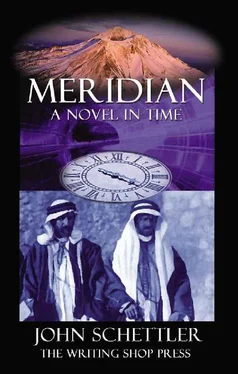Oddly, they still had not discovered what it was they did to reverse the Palma Event. Paul’s Pushpoint was hiding there somewhere, he thought, but no one could discern what it was.
He sighed with resignation. So much history would remain comfortably unknown, safe in the shrouding mists of time. The day he gave in on the matter was the day he hatched his little plan for one last mission—on the sly, of course. He simply had to try it one more time, no matter what the danger. He would plan things very carefully, research it all right down to his derby and shoes. He would parse out the mathematics through his graduate intern contacts. He could spread the calculations through the heads of ten to twelve different people, and no one would ever see the whole, or know what they were for. He would hire an expert to simply verify his final solution on an Arion mainframe, telling him it was all some arcane physics program. He would slip in late at night, and set it up so that he would only be gone for an hour or so. That was all the time it would take him. No one would know about it until after the fact. Then he would apologize, offer to pay for the electrical bill for a month out of his own pocket, and swear that he would never so much as think about doing something like this again.
Just for good measure, and to lessen the scourge he knew he would have to endure from Maeve as his penance, he chose something simple; something that would not upset anything. He would just go back and solve one of history’s little enigmas, that’s all. It would be a wonderful postscript to the mission he had taken with Paul, and it wouldn’t harm a flea on Mother Time’s back.
So here he was, riding in coach number seven as it rolled into Reading Station west of London on a crisp November day in 1919. He would bide his time, watching carefully from his window seat until his quarry left the train and made his way over to the ‘Refreshment Room’ for a mid-day tea and crumpet. The man would be carrying a messenger’s bag, of the sort they used to transport important papers, currency, or gold. Why his mark selected such a bag was beyond him. Surely it would be hard to overlook where he was going to leave it haphazardly under the table in the Refreshment Room. Surely it would be a severe temptation to anyone who found it.
Nordhausen planned to head for that very room in just a minute or two. He waited patiently, counting out the seconds, and then stood up with a clear resolve. He hefted the stout walking cane he had brought along, as if to test its strength for the odd use he had in mind. It was a solid piece of lacquered hickory, with a burnished brass cap. It would serve him quite well, he thought, as long as he kept a bit of guts behind it.
He would make his way into the station and take a seat in the Refreshment Room, very close to Lawrence himself. Yes, it was Lawrence he had come to see again. His presence on the train had been well documented, and Nordhausen was sure he would be here. The professor wondered whether he would still have that eerie amber glow about him now that he had fled from the heroics of his desert exploits to the relative anonymity of English Society again. Still, he would have his book with him—the manuscript, the very first draft of the Seven Pillars of Wisdom . If his claim that it was lost, or stolen on this very train trip was true, Nordhausen would soon find out.
The version of the book the professor relied upon for their harrowing excursion to Kilometer 172 was actually the third draft Lawrence made of the story. The first he lost, on this very trip to Oxford. The second he destroyed himself, perhaps out of grief for what he failed to accomplish, or some hidden shame that would dog him the rest of his brief life. The third would survive to become the classic that had saved the Western World, but the first two copies of the manuscript were never found. There was no point trying to get at the second draft. The research was too hazy in that direction. But this first draft was right here on the train, in the bank messenger’s bag, and reputedly left under his table when Lawrence stopped here for a brief refreshment. Someone was going to try and make off with it, and that someone was going to feel the sharp crack of Nordhausen’s cane before the hour was through.
Lawrence would reach Oxford, and realize his bag was gone. He would place a call to the Reading Station, in the hopes that someone there would recover it. The professor thought about that for a moment. Should he turn the bag over to the Station Master? He would still be able to read it, as it would undoubtedly be published at some time. The more he considered the matter, however, the more he began to hear the snarl and growl of Paradox on the fringes of his surreptitious plan.
No, this time the threat of Paradox favored his plan. If he turned it in, then Lawrence would not have to re-write the book as he did later that year. If the story was altered, ever so slightly, then the clues which led them all to Kilometer 172 might never be there. Everything could come unraveled in that event… Everything . Maeve was really quite correct in the end. They would change things without even knowing it, just as they did at Minifir. He couldn’t take the risk, so he decided to take the bag instead. After all, it was lost and never recovered. It was probably taken by some ignorant station worker who did not have the slightest appreciation of what he was stealing, or even who his poor victim was! All he had to do was make certain Lawrence was well away on his train before he recovered it, and if someone got to it first, he had his cane.
The professor rubbed his hands in anticipation. He would see to the matter once and for all. If history could find no use for the precious draft, he would be quite happy to take it under his loving wing, and fly away.
And that is exactly what he did.
The End
“The hardest strokes of heaven fall in history upon those who imagine that they can control things in a sovereign manner, playing providence not only for themselves but for the far future – reaching out into the future with the wrong kind of farsightedness, and gambling on a lot of risky calculations in which there must never be a single mistake.”
English Historian Sir Herbert Butterfield
“Certainty about prediction is an illusion. One thing that history keeps teaching us is that the future is full of surprises and outwits all our certitudes.”
Arthur Schlesinger, Jr.
Time travel has always been a favorite grazing field for me. Ever since I first saw the H.G. Wells classic as a youth, and read his story, I have been fascinated with the thought that some day humans might learn to travel in time. Perhaps they will, though people like Steven Hawking, who have pondered the physics deeply, don’t seem to think it very likely, or even possible. Hawking’s argument, that we should be awash with time travelers from the future if it ever becomes possible to visit the past, was recounted through Nordhausen’s voice at the outset of the book. The time theory that was vindicated by the appearance of Mr. Graves was my answer to Hawking’s challenge.
One of two possibilities present themselves when considering this question. The first is that we don’t see time travelers from the future because they have no interest in visiting us, a solution our egos might find hard to swallow. The second is even more perplexing: we are seeing time travelers from the future, only they are the reason for the many strange UFO sightings that have occurred in recent years—not beings from another planet. Would this explain why the aliens many abductees claim to remember appear so human in form, like strangely evolved primates? I shudder to think that the entire UFO phenomenon is actually subtle tampering by future time travelers. Perhaps, as Maeve feared, a Time War is going on, and the late 20 thCentury became a particularly fertile field for battle. Or perhaps we are being visited, but the travelers are very clever about concealing themselves.
Читать дальше












